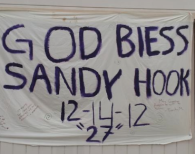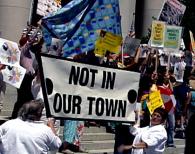Slate: "Productive" Response to Kansas Hate Group
When the Westboro Baptist Church hate group announced that it would picket the funerals of the Newtown, CT shooting victims, many people were filled with outrage. In response, the cyberhacking group Anonymous hacked the website and Twitter pages of the WBC in a form of revenge. Slate writer Will Oremus states that there have been more productive responses to the Westboro Baptist Church, particularly the pro-tolerance counter protest of Gunn High School. This counter protest was effective because it worked to empower the students and strengthen the school’s values of acceptance and tolerance. Slate also featured our video, “Gunn High School Sings Away Hate Group,” below.
Talking to Your Kids About Newtown
hate group response
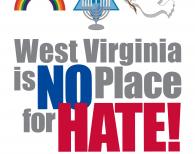
Today we uploaded three new files to the Not In Our Town Action Kit: Materials from West Virginia's successful multi-pronged action campaign titled, West Virginia: No Place for Hate.
Though this counter-protest occured in 2010, we believe these resources remain relevant and inspiring today. West Virginia leaders came together after Fred Phelps' Westboro hate group announced it would picket Catholic and Jewish institutions in the two towns, a local university, and a mine where more than a dozen miners had recently lost their lives.
The Not In Our Town Action Kit is a hidden gem on NIOT.org, compiling resources from communities standing up to hate and intolerance. In addition to these materials from West Virginia, you will find:
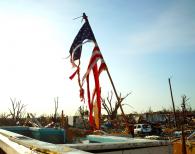
From SacBee.com. See original article.
After the trauma of last week's tornado—the deadliest on record—Joplin, Mo. will now be descended upon by a hate group. The Westboro Baptist Church will protest President Barack Obama's visit to the town on Sunday.
News of the hate group's visit traveled quickly, sparking people to action. Amid the rubble, people are standing up in support of this town of 50,000, including the 125 dead and the more than 900 injured.
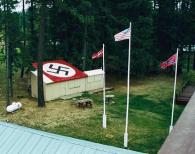
How Ordinary Citizens of Northern Idaho Defeated the Aryan Nations
By Tony Stewart and Norm Gissel, Kootenai County Task Force on Human Relations
In the 1950’s a small group of religious leaders, fed up with Jim Crow racism, started the modern civil rights movement. They demanded that the promises of the Declaration of Independence and the 14th Amendment, declaring equal protection under the law to all citizens, finally be enforced. The vast majority of Americans agreed. What followed was a sea change in the cultural and political life of America. Millions of Americans were recognized for the first time as full members of our great country, and almost overnight, civil rights, formerly a fringe concern, became a mainstream one of most Americans.
But as history has shown us, in a democracy, great cultural and political changes do not occur without a large array of opponents.
